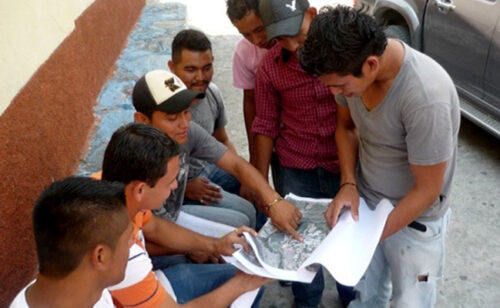In Guatemala, Participatory Planning Produces Strategic Blueprints for Cities

Is it possible for urban municipalities to efficiently deliver public services without a strategic annual operating plan?
Surely, large-scale infrastructure projects, like road construction or amplification of primary schools over a region, require multi-year plans. At the end of each year, municipal planning departments in Guatemala scramble to deliver a key document – the Municipal Annual Operating Plan, a strategic, multi-year blueprint for a city. When done correctly, these plans serve as an indispensable resource for both government and citizens. The plans improve living conditions and reduce social inequality that has historically plagued Guatemala. Due to a lack of a cohesive governance structure, it has been over a decade since these municipal annual operating plans have resulted in a clear plan for delivering public services.
The Urban Municipal Governance (UMG) project, funded under USAID’s Making Cities Work contract, is a five-year project designed to reduce levels of violence in municipalities most at risk of violent crime through enhanced municipal governance, increased coverages and quality of municipal services, and greater citizen participation and oversight.
Using an organizational capacity assessment tool to identify this common governance issue, the project implemented a three-month technical assistance initiative to help four municipalities – Malacatán, Coatepeque, Chimaltenango, and Villa Canales – to deliver high-quality operating plans to the Ministry of Finance before the December 15 deadline.
The constraints range from a lack of staff in a municipality’s planning department to a lack of basic information about the needs of residents. “Many people from different departments do not know these assessment tools or how to fill them in” said Edwin Barrios, director of the planning department in Malacatán.
Adding to this is pressure from national institutions like the Ministry of Finance and the Presidential Secretariat of Planning and Programming (SEGEPLAN) to reject incomplete or poorly completed documents or delay approval if supporting documents are lacking. Poor documents can mean fines and sanctions from the Comptroller-General of Accounts, and lower scores in the Ministry of Finance municipal ranking. On the other hand, a sound operating plan earns municipalities credibility with these oversight bodies.
UMG interviewed municipal planning staff, analyzed the data, and then trained more than 80 individuals involved in planning regulations. The initiative cemented a positive working relationship with a wider range of municipal officials and, as discussed below, demonstrated how coordination, communication and a little technical assistance can add value to municipal governance efforts. The upshot is improved accountability and efficiency in delivering urban services.
“One of the biggest challenges in this process was the lack of basic data on communities,” said Leonardo Catún, an independent consultant working with UMG in Villa Canales and Chimaltenango. The Municipal Code outlines how planning departments should maintain up-to-date databases of the population, community infrastructure and community services. In Chimaltenango, there is data for the urban centers, but not for rural communities, he said.
Municipal staff do not have experience or training in strategic planning or in results-based management, said another consultant, Adrian De Leon, responsible for implementing the activities in Coatepeque and Malacatán. “The regulations actually require every department to have an annual operating plan, so this capacity needs to be strengthened further.”
Another challenge for municipalities is a lack of knowledge of strategic planning and the operating plan process in general. UMG purposefully sought participation of a wide range of municipal offices – including the Department for Women, the Office of Protection of Children and Youth, the Water Department, and Public Services as well as Finance and Planning. A pre-and-post test was implemented in the workshops, and in Chimaltenango, there was a 44% improvement in knowledge and understanding of the process.
Support from UMG was ‘specific, consistent and clear,’ and helped everyone understand the formats better, said Barrios. “The workshops were participatory, dynamic and friendly and staff were motivated to deepen their understanding of the process, rather than just fill in tables.”
In the end, the desired outcome was achieved: four completed Annual Operating Plans were submitted to authorities with all the required supporting documents. This was an expected number based on the level of effort of training and the potential to complete these plans across offices. A wider range of municipal technical staff felt that they had collaboratively contributed to the municipal community development strategy. Department heads came away appreciating that working together produces a better end product.
“The collaboration was very valuable,” said Hector Ovando, planning director in Villa Canales. “The Operating Plan this year was more complete, and was elaborated in a better way. We had a good result.” This project demonstrates that there is a need to train staff to educate them on how their can work together to problem solve in a participatory manner and plan for urban service delivery in Guatemala.
By Graeme Thompson, Communications and Outreach Specialist for Urban Municipal Governance at Tetra Tech

